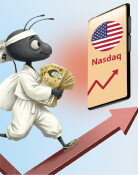[Opinion] September Crisis Talk
[Opinion] September Crisis Talk
Posted September. 02, 2008 08:58,
Koreas benchmark stock market KOSPI fell four percent and the won plunged to 1,110 against the dollar yesterday. Many blame new negative factors at play such as the rumored cash crunch of a conglomerate in addition to existing conditions such as the global economic slowdown. No wonder yesterday`s news shocked many investors, which happened to be the first day of September, the rumored month of crisis. Experts say, however, that foreign investors are unlikely to flee the nation after cashing in domestic bonds worth 6.7 billion U.S. dollars set to mature this month. The doomsayers maintain the short-term bonds could cause a major crisis. The truth is, many foreign investors bought domestic bonds without the need for extending their maturity periods. Foreign investment banks also bought back domestic bonds and shares last month that had been sold en masse in June and July.
Problems, however, remain in the Korean economy. First, the circumstances and economic indicators amplifying the September crisis talk do not look positive. Low growth and high inflation have caused the current account deficit and foreign debt to snowball. The dark outlook for investment and job creation has also dampened the market. Second, distrust is growing against the government, which was too quick to pass the blame on exogenous factors such as surging oil prices and the U.S.-triggered financial crisis for Korea`s economic woes. The market, however, is doubtful of the governments ability to take the right actions. Over the past six months, the incumbent administration has forced many to fret over government failure rather than market failure.
The economy is all about confidence. Therefore, rumors of a crisis are likely to become a self-fulfilling prophecy. Nonetheless, President Lee Myung-bak seems to have grown attached to the words economic crisis. Soon after he took office in March, he said, This is only the beginning of an economic crisis. When oil prices skyrocketed in July, he warned of a third oil crisis. A month after, he said, The economy is in trouble due to an energy crisis. Judging from the strength of his past comments, he should have presented a set of specific measures to tackle these crises while urging the people to take certain actions. He did neither, and opposition parties are justified in criticizing him as the boy who cried wolf.
A government unable to detect crisis is hopeless. Equally troubling is a government that amplifies anxiety by citing the urgency of a situation without providing solid countermeasures. This affects all economic activities big and small, such as stock investment and property transactions. Another huge side effect is that people become insensitive to elements that could cause a more serious and longer-lasting crisis, such as lack of investment and labor shortage.
Editorial Writer Hong Gwon-hee (konihong@donga.com)




![반찬통 착색 고민 끝…‘두부용기’ 버리지 말고 이렇게 쓰세요 [알쓸톡]](https://dimg.donga.com/c/138/175/90/1/wps/NEWS/IMAGE/2026/01/09/133126593.3.png)


